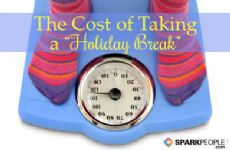|
There's no doubt that rewarding desirable eating behaviors is a very good way for us humans to get ourselves to stick to healthy eating plans, even when we’d rather go for the gusto. But not just any reward will do the trick. You have to be careful to reward yourself for the right things at the right time. There are three very common mistakes people run into when they try to use rewards to motivate themselves. Read on to find out how you can avoid them. The problem here is that you’re not reinforcing your own behavior—you’re rewarding the scale, which really couldn’t care less. Rewarding yourself for what the scale does is like trying to train a child to tie her own shoes by giving her shoes with velcro straps. It doesn’t work. If you want your rewards to make it easier for you to stick to your goals, you need to reward yourself for for doing the things you need to do, not for outcomes that aren’t totally in your control. So, use rewards to reinforce specific behaviors like sticking to your calorie range today, actually doing the exercise you had planned, or successfully managing some problem that’s been getting in your way frequently. For example, if you’re trying to change eating habits, you could focus on one problem area or meal at a time, rather than on having a “perfect day.” Start by rewarding yourself for getting off to a good start for the day with a healthy breakfast, or for skipping that extra snack you usually have in the evening, or for bringing your own lunch to work instead of going out for fast food.Then as that problem is resolved and the new behavior starts to become routine, add on another problem area or goal, and keep doing this until you’ve got a good routine going for all your daily meals and snacks. Success at establishing a complex behavior pattern like healthy eating has to be built up one step at a time, and you can use rewards to gradually “shape” your behavior in progressive steps--if you avoid the all-or-nothing tendency. The perceived value of the reward is also important. It needs to be significant enough that you’ll miss it or feel a little deprived if you don’t earn it, but not so important that not getting it causes other problems of its own. For example, if you really enjoy your morning cup of coffee, make that your reward for eating a healthy breakfast—you don’t get it on the days you don’t have the kind of breakfast you want to. But if missing your morning coffee means that you’re likely to punch out the boss or yell at the kids, find a different reward. If you have a favorite TV show you like to watch in the evening, make that your reward for getting your exercise in. Otherwise, you have to do your exercise instead of watching the show. It’s never a good idea to make your reward something that’s inconsistent with the goal behavior you’re trying to establish—for example, don’t reward yourself for eating well by giving yourself a food treat that will blow your diet plan. Do you use rewards to keep yourself on track? What works best for you? |
More From SparkPeople
|




















